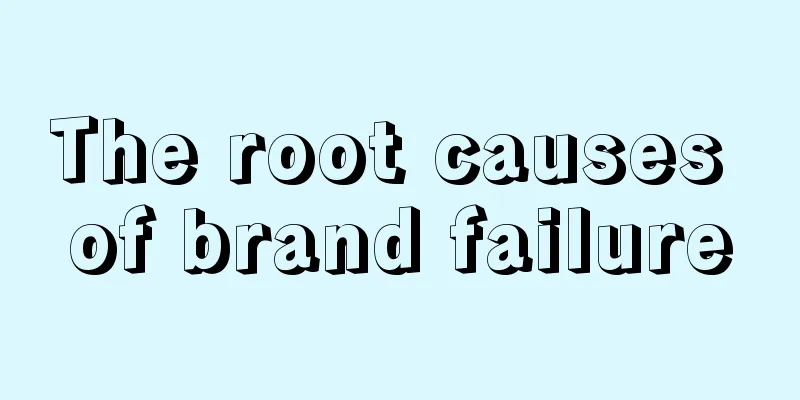The root causes of brand failure

Today, as business changes rapidly, market uncertainty and discontinuity have led companies to pursue effectiveness in marketing. There is nothing wrong with this. Companies must achieve results, and the market only recognizes results. In the past 10 years, the Nianzhi team has continued to track the brand marketing development of more than 80 companies and found that many companies that pursue extreme effectiveness and pay great attention to exposure, topics, and conversions have gradually declined, while those companies that always attach importance to customer value are thriving and developing better and better. Today, based on our insights and thoughts from the companies we have been tracking, I would like to talk to you about the main issues facing marketing. 01 Failure due to unclear business goals: What exactly are you providing to your customers?The failure caused by goals mainly comes from the top management of the company. The results of tracking and analysis of these companies show that the management who sets long-term goals and policies is responsible for this. Let's look at some examples: In recent years, China's supermarket industry has stopped growing, not because demand and consumption capacity have shrunk. In the next 10 years, China's retail demand for consumer goods will grow by an average of more than 16% per year (recently, many private board meetings and business schools have produced consumption data from April and May to prove that the economy has begun to decline, and have also produced a lot of so-called consumption downgrade data to prove that consumption has been weak, especially the per capita consumption during the 5.1 Golden Week as proof. I will talk about this issue in a special question later). Demand has been growing. China's supermarket industry is now in trouble, not because the relevant demand has been met by other business forms (e-commerce, live broadcasting, new retail, WeChat business). It is because its own industry has failed to meet these demands. The managers of supermarkets allow other new business forms to snatch their customers. The core reason is that supermarkets position themselves as offline store businesses rather than consumer goods businesses. The reason they misposition their industry is that they only focus on the business form of their supermarkets, rather than consumer goods; at the same time, they only focus on how much they can sell, rather than really paying attention to customers. (Including RT-Mart, Carrefour, China Resources Vanguard, and even Pangdonglai all have this problem.) After giving the example of China, let's take an example from the United States: The development of the television industry almost wiped out Hollywood. In fact, due to the development of the television industry, all the old film companies at that time had to completely reorganize, and some film companies even ceased to exist in this round of impact. These companies fell into unprecedented difficulties, not because of the invasion of television, but because they themselves suffered from marketing short-sightedness. Just like the mistakes made by China’s supermarket industry today, these Hollywood film companies have failed to correctly define their own business; they consider themselves to be in the film industry, but the essence of these Hollywood companies is actually the entertainment industry. If Hollywood defined itself as the "movie industry," with the word "movie" implying a specific, limited product, it would lose its vitality. This narrow vision led to a foolish complacency in Hollywood, which led producers to see television as a threat from the beginning. Hollywood ridiculed and resisted television, when it should have embraced it and seen it as an opportunity to expand the entertainment industry. Do you still remember that a few years ago, Wang Jianlin took the initiative to make a bet with Jack Ma, saying that if e-commerce could surpass offline by 2020, he would give Jack Ma 100 million yuan, and if it could not, Jack Ma would give him 100 million yuan. Later, Jack Ma came up with the new retail. In China, there is a group of Chinese entrepreneurs who attach great importance to positioning. They are severe patients of marketing myopia. Once a famous positioning master positioned Xibei as "Xibei Northwestern Cuisine". Later, only people from the northwest went to eat Xibei. Fortunately, Jia Guolong of Xibei reacted quickly, realized the mistake quickly, and quickly changed it to "Xibei Oat Noodle Village, I love Oat", which brought Xibei back on the right track. Entrepreneurs who highly praise positioning rarely look at positioning from another dimension. In the past 30 years, among those companies that adopted the so-called positioning, how many have survived? In addition to having a strong influence in the Chinese market, Trout has a strong influence in other business entities around the world (including his hometown, the United States. How many people believe in their theory?) Procter & Gamble, Coca-Cola, Campbell Soup, Unilever and other companies have been prosperous for many years. Procter & Gamble produces high-quality products, and the so-called product segmentation is just a specific market strategy. However, regarding the strategy itself as the goal of the enterprise is the marketing shortsightedness of some entrepreneurs who highly respect positioning. Even in 2021, the scale of the television industry (the impact of online video sites and streaming media on the television industry will be discussed in future articles) is larger than the narrow film industry at any time. If Hollywood focuses on customers (providing them with entertainment) rather than the product itself (making movies), will Hollywood's film companies still be in trouble? I have my doubts about why Hunan Satellite TV and Zhejiang Satellite TV have continued to achieve tremendous development in the innovation and upgrading of the traditional television field. It is because these companies realized that what they do is not just television itself, but also providing entertainment. So who saved Hollywood later? It is a group of young screenwriters, producers and emerging directors. It is their success in the television industry that has destroyed many old film companies and even brought down the super giants in the film industry. In addition to the two industries in China and Hollywood that I mentioned above, there are many other industries that have or are currently having their future threatened due to inappropriate definition of their goals (what kind of services are they providing to customers?), such as Huiyuan Juice which has just entered bankruptcy liquidation, Dong-E E-Jiao which started out by selling donkey skins, Wahaha, the Chinese water industry leader, and Sohu, once the largest Chinese portal, and many others. I will discuss the following content in detail, and I will also analyze the reasons that lead to the predicament, trying to help these companies cure their marketing myopia. Next, let's look at how a management approach that is completely customer-centric can keep a growth industry growing, even when the obvious opportunity in the industry no longer exists. Let's take two industries that have long been around and are extremely mature - the nylon industry and the glass industry. These two companies are DuPont and Corning in the United States. I believe everyone has heard of Corning. Lei Jun, Yu Chengdong, and "talk show" actor Luo Yonghao often mention them. The various mobile phone screens we use now, including the latest iPhone14 and mate60pro, all use Corning glass. First of all, it cannot be denied that both companies have strong technical strength and are product-oriented, but these two reasons alone are not enough to explain their success. After all, the textile company that was once prosperous was also completely product-oriented and had a strong product awareness, but it was completely defeated. The main reason for DuPont and Corning's success is not that they focus on products or research, but that they insist on being completely customer-centric. It is precisely because they keep paying attention to new opportunities and use their technical capabilities to develop products and services that can meet new customer values and new uses that meet customer needs that they are able to launch successful new products, such as the Corning Gorilla Glass I just mentioned. Almost all mid- to high-end mobile phones around the world use their products. Without in-depth customer insight, most of their new products are likely to fail to sell and their sales methods will be ineffective. The aluminum industry is also still developing, and the aviation aluminum it has launched is also a material that many mid-to-high-end machine manufacturers are willing to use. 02 Incorrect analysis due to subjectivityAfter reading this, some people may argue that it is very stupid to compare supermarkets with aluminum, or movies with glass. Aluminum products and glass are widely used. Shouldn't they have more growth opportunities than supermarkets and movies? This is the subjective erroneous view I want to point out. It defines an industry, a category/product, or a series of technologies very narrowly, which will inevitably lead to the premature decline of enterprises or industries. When we go to "supermarkets", we must make sure that we are referring to "providers of consumer goods". As providers of consumer goods, consumer goods still have huge growth potential in China today. Let's take a look at a data that everyone knew during the epidemic last year. There are still 600 million people in China with an average monthly income of only 1,000 yuan. Not only the consumption upgrade of the middle class, but also the growth of the income of these 600 million people will generate huge growth potential. Therefore, it should not be limited to the current so-called business scope. What the supermarket industry lacks is not opportunities, but the imagination and courage of managers. It is these two points that have made this industry great (thanks to the innovation of Walmart founder Walton). Barzun, a famous European historian and cultural researcher and critic, said something that fully expresses my sadness about the supermarket industry: "I am saddened to see that the most advanced industry serving the public in the 19th century has declined because it no longer has the extraordinary imagination that helped it rise; what it lacks is the will to survive of the companies in the industry and the motivation to meet the public's wishes with innovation and technology." In 2020, we helped a company that runs supermarkets and shopping malls to carry out imaginative business innovation upgrades. During the entire strategic report and communication, after we made our proposal, almost everyone opposed some of the business upgrade innovations and put forward their own extremely conservative opinions. Later, under our strong support, they fully understood our imaginative business innovation plan, but during the implementation, they began to become conservative again, and our team had to constantly correct our mistakes. 03 The shadow of being eliminatedEvery major industry in the market must have had very strong growth at one time or another, and was once dubbed a "growth industry". For each of these industries, people tend to think that their strength lies in the obvious superiority of their products or services, and there seems to be no effective substitute (in fact, these products themselves have also successfully replaced other products or services). However, one after another, these famous industries have been shrouded in the shadow of obsolescence. Next, let's take a quick look at a few cases that have not received enough social attention so far. 1. Dry cleaning industryThe dry cleaning industry was once a promising growth industry. In 2012, Premier Li Keqiang called for mass entrepreneurship and innovation when answering reporters' questions. Zhang Rongyao founded e-bag washing in the dry cleaning industry in November 2013. e-bag washing appeared in front of the public as a mobile Internet smart washing and care platform, but later began to decline due to various reasons. In the wool era, dry cleaning finally made it safe and easy to clean clothes, so it was only natural that the industry would continue to grow. But after 40 years of prosperity, the industry is now in trouble. Where is the competition coming from? From better ways to clean? No. Competition comes from synthetic fabrics and chemical cleaning agents that replace dry cleaning. But this is just the beginning. There is a powerful magical technology that will completely eliminate the chemical dry cleaning industry. Although it is only used on a small scale now, it is ultrasound. 2. Motorcycle industryThe motorcycle industry was once a thriving industry, with companies such as Zongshen Motorcycle, Lifan Motorcycle, and the two brands I worked for when I first started out, Dayang Motorcycle and Dayun Motorcycle. However, with the development of the market, the motorcycle industry has lost its glory due to its safety, noise, and the popularity of cars. Yin Mingshan, the once glorious founder of Lifan Motorcycle, had to accept the fate of failure in his seventies. However, if we define it as the travel industry, the up-and-coming American Tesla has a market value of 500 billion US dollars, and its founder Musk has become the world's richest man. NIO, Xpeng Motors (although it has been in decline recently, but we will continue to take a look at it), and Ideal are also very good. 04 Entering a cycle of self-deceptionIn reality, people tend to be forgetful. For example, those who are now confidently cheering for the two super industries of mobile Internet and new retail find it difficult to see that these fast-moving industries may face crises. Look at the seven-word formula for mobile Internet proposed by Lei Jun: speed, extreme, focus, and reputation. Now it is basically no longer mentioned, and Xiaomi has also started to open Xiaomi Homes offline. Luo Zhenyu, once a promoter of paid knowledge and a mobile Internet evangelist, has also become a "faded internet celebrity". His business has also been redefined from paid knowledge to knowledge services, and then to the so-called creation of a "general education university". But there has not been much improvement. So how can companies cure marketing myopia? I have summarized some of my thoughts on business innovation over the past 15 years and would like to share them with you. 1. Get rid of narrow product conceptsMany people believe that lower production costs for a product will result in attractive profits. This is perhaps the most serious form of self-deception and can cause great trouble for companies, especially "growth" companies, because for these companies, the growth in demand is obvious, which will naturally reduce their focus on marketing and the importance of customers. This single-minded focus usually leads to industry decline rather than growth, and often means that products fail to adapt to changing consumer needs and tastes, to adjusted marketing systems and practices, or to product developments in competing or complementary industries that are so focused on their own specific products that they are unable to see their own product shortcomings. Take the well-known mobile phone industry as an example, Nokia was replaced by Apple. Everyone thinks that Nokia replaced Apple because Apple invented the smartphone and established a huge ecosystem, etc. But these were all later Apples. When Apple first launched the iPhone 3G, it was almost half a brick, the system was not easy to use, the network was slow, and the screen was not big. It did not attract much attention from consumers, but Nokia at that time used a narrow product concept to operate its products. Nokia's mobile phones covered all kinds of products, from a few hundred yuan to a few thousand yuan. Apple, on the other hand, considered its customers and what kind of products and services they needed, so it established an ecosystem to make mobile phones more user-friendly. Everyone knows how it ended. 2. Disruptive innovationThis concept was proposed by Christensen, the father of innovation theory. However, it is easier said than done. We need to first clarify the content and results of this idea. I will also take the example of the refueling service of PetroChina and Sinopec, which are familiar to everyone. To explore disruptive innovation, we need to start from the source of the business, that is, the customer. As we all know, drivers hate refueling because it takes up a lot of time. Especially when there are queues, what people are actually buying is not the car but the right to continue driving. Gas stations are like tax collectors, people must pay regular fees as the price of using the car, so gas stations are basically unwelcome places. If you want to get rid of unpopular gas stations completely, it means abolishing them. No one likes tax collectors, even if they are pleasant. No one likes to stop on the road to buy a product they can hardly see, even if the seller is a handsome guy or a beautiful girl. And companies that develop various exotic fuel alternatives will be greatly welcomed by people because they will save people the trouble of frequent gas stations. These companies are at the forefront of the future not because they have created something technologically superior or cutting-edge, but because they have met the urgent needs of their customers; at the same time, they are also eliminating harmful gases and air pollution. Your current new energy vehicles are actually such an attempt. Once the oil companies realized what a new energy system could do to satisfy their customers, they knew they had no choice but to develop efficient, long-lasting fuels (or to deliver gasoline in a way that didn’t intrude on drivers), just as large food chains had to go into the supermarket and convenience store businesses, or vacuum tube companies had to go into semiconductor manufacturing. For their own benefit, PetroChina and Sinopec must destroy their own high-profit assets. Besides, no amount of wishful thinking based on existing products can save them. Oil companies must carry out this kind of "disruptive innovation" to maintain growth. When Wang Jianzhou was the chairman of China Mobile, he also saw the potential threat that companies like Tencent could bring to them. To face this threat, some people also proposed various disruptive innovation methods to them, such as waiving phone and Internet charges and charging for value-added services. But was it possible for Wang Jianzhou to make such a choice under the circumstances at that time? Obviously not. I give the above example because I believe that the founders and managers of enterprises must work hard to break free from the constraints of traditional methods. In today's post-mobile Internet era, 5G, and the Internet of Things era, it is too easy for a company or an industry to allow its goals to be dominated by the idea of fully utilizing production capacity, forming a dangerous and narrow product-oriented tendency. In short, if managers allow this tendency to develop, the company will inevitably see its mission as providing products and services rather than creating customer value and satisfying customers, although the company may not say to its sales staff: "People just sell things, we will consider the profit." But without realizing it, companies may be practicing this principle that leads to decline. You know, it is because the industry is full of narrow, self-destructive product concepts that have ruined the fate of one growth industry after another. I have been talking about the need for iteration in marketing, and the product-centric concept does not meet the needs of the market. The example just now can illustrate this well. 3. Pay attention to real marketingThe purpose of sales is to create immediate profits; while marketing, based on market demand, builds an effective mechanism to continuously meet customer needs in order to create future profits for the company. Sales refers to the promotion of products and services to customers based on the company's current business. Sales believes that organizations must actively engage in sales and promotion activities (such as training sales staff in sales skills, designing a bonus system to motivate sales, and establishing a good sales staff management system) in order to achieve corporate performance. Therefore, the focus of sales activities is basically to achieve the company's performance today and earn "today's profits", while consideration for the future is minimal. Many companies seem to attach great importance to marketing, but in fact, they focus on sales and promotion rather than real marketing. Marketing considers how to respond to changes in the environment and customer needs by establishing a system. The core thinking point is to continuously meet the changing needs of customers in order to obtain "tomorrow's profits." Companies accumulate profits today through sales, but cannot guarantee profits tomorrow. For tomorrow's profits, companies constantly explore and pursue sustainable growth, which is the role of marketing. Sustainable operation is the pursuit of almost all companies. Obviously, only good marketing can enable companies to achieve the goal of sustainable operation. When Sony designed the Walkman, when Nintendo designed the video game console, when Toyota launched the Lexus, and when Apple designed the iPhone, they were overwhelmed with sales in the market because they designed the "right" products based on a lot of marketing work. The difference between marketing and sales is as follows: Marketing is a form of strategic thinking that focuses on:
Sales is a tactical thinking, focusing on: Explore what sales techniques and methods are available; Concerned about how to sell all existing products; Focus on achieving current sales targets; Sales power is the core of all actions; Creating results is the key The purpose of a company's strategic thinking in marketing is actually to make sales redundant. Therefore, the basic principles that need to be considered in real marketing are market, customers and demand. 1. Target MarketIt is not possible for an enterprise to operate in all markets and meet the needs of all customers, and it is even impossible to do all the work in a large market. Therefore, market segmentation, selection and positioning are very necessary. Market segmentation refers to the classification process of a certain market into several customer groups based on differences in customer needs, desires, purchasing behaviors, purchasing habits, etc. through market research. Each customer group is a market segment (target market), and each market segment is a group of customers with similar demand tendencies. 2. Customer OrientationWhen describing the success of its Lexus cars, Toyota managers said: "Our corporate goal is to exceed customer satisfaction. Our goal is to make customers happy." Toyota's smart move is to frequently test customer satisfaction. For example, the company asks recent buyers about their satisfaction over the phone and divides satisfaction into several categories, such as "highly satisfied, generally satisfied, no opinion, somewhat dissatisfied, and extremely dissatisfied." This is also Toyota's main way to discover customer satisfaction and dissatisfaction. The information collected becomes an important basis for the next stage of work. 3. Integrated MarketingWhen all departments of an enterprise serve customers, the result is integrated marketing. Integrated marketing has two meanings: First, the integration of various marketing functions - salespeople, advertising, product management, marketing research and other activities must be coordinated with each other. For example, the marketing department must be well coordinated with other departments of the enterprise. It is difficult for the marketing department to work independently. Only when all employees attach importance to customer satisfaction can they really work effectively. A senior executive of HP pointed out: "Marketing is too important to be regarded as the business of the marketing department alone!" IBM can even make its current employees understand how their work is related to customers. Another meaning of integration is that companies should conduct both external marketing and internal marketing. External marketing refers to the external marketing of the company, while internal marketing refers to successfully hiring, training and motivating employees to work well for customers. Today, more and more managers are beginning to realize that customers are the key to the company's ultimate profit. 4. ProfitabilityThe ultimate goal of marketing is to help organizations achieve their goals. You know, the key is not to pursue profit itself, but to make profit as a by-product of doing a good job. Companies should make profits by meeting customer needs better than competitors. Let's take a look at the business philosophy of Frank Perdue, the American chicken king: his Perdue Feed Farm can generate an annual income of $1.5 billion from broiler chickens, with a profit margin much higher than its peers, and its broiler chicken market share in major markets has reached 50%. However, the company's founder, Frank Perdue, does not believe that "chickens are chickens" or that customers are customers. His motto is "It takes a competent person to raise a good chicken." He even offers a guaranteed refund for unsatisfied customers. He is so focused on producing quality chickens that customers are willing to pay a premium for them. He firmly believes that if a company strives to produce quality products, goodwill, high profits, market share and development will follow. Once you really start to pay attention to marketing, your business will become different. 05. Build a great visionIt is undeniable that in order to survive, a company must meet relevant needs. The company must adapt to the needs of the market, and the sooner the better. But survival is a very general desire, and anyone can survive in some way, even a homeless person. The key is to survive heroically and feel the excitement and rush of business mastery - not only to experience the sweetness of success, but also to feel the greatness of the entrepreneurial spirit from the bottom of your heart. A company cannot become great without a leader who is driven by a strong desire to succeed. A leader must have a great vision that attracts a large number of passionate followers. In business, followers are customers. Steve Jobs established Apple's great mission and vision, which made countless customers become its followers, called "Apple fans". If you ask me, Apple's mission is "extraordinary" and their vision is "changing the world". To generate these customers, the entire company must be viewed as an organism that creates customers and meets their needs. Drucker also once said that an enterprise has two basic functions, innovation and marketing, and the essence of marketing is to create customers. Managers cannot think of themselves as product manufacturers, but rather as providing value and creating customers. Managers must infiltrate this concept (and everything it contains and requires) into every corner of the company, and must persist in doing so, and have a certain degree of creativity to motivate organizational members. Otherwise, the company is just a series of categorized parts without a common goal and sense of direction. To cure marketing myopia, companies must change and no longer see themselves as providers of products and services, but learn how to impress customers and do something to make them willing to trade with them. Founders and CEOs have the responsibility to create this environment, express this view, attitude and desire, and must also determine the company's style, direction and goals. This means they must know exactly where they want to go and make the entire company aware of it and passionate about it. This is the first requirement for a leader, because unless a leader knows where he wants to go, he can only get so far. When I give lectures, I always say this: If you know where you are going, God will make way for you. If you don’t know where you are going, all roads are dead ends. If a company is going to take its course, the leader can just resign. If a company doesn't know or care what the future holds, it doesn't need a formal leader to communicate that fact. Everyone will notice it soon enough. As China moves from a manufacturing power to a branding power, what it needs is for everyone to work together to solve marketing problems and a group of companies with great visions need to emerge. Author: Liu Yichun Source: WeChat public account "Liu Yichun's Brand Business Innovation (ID: shangyeyiguohui)" |
<<: Xiaohongshu’s maternal and infant insights: What content are brands paying for?
>>: The super traffic code behind small advertisements
Recommend
Douyin group buying: huge traffic "troubles" offline merchants
This article introduces several major problems tha...
How many steps are needed to build a user search index system?
In daily life, search is one of the functions that...
What should I pay attention to when distributing products on Amazon? How does Amazon distribute products in large quantities?
As one of the world's largest e-commerce platf...
Spending thousands of yuan to date a "paper man", who is creating dreams for 2D girls?
Why would someone be willing to spend thousands of...
This generation of post-00s are all crazy about Phoenix Legend
This article mainly describes the love of Phoenix ...
New Hope’s private domain analysis shows that customer acquisition has increased 10 times, with a repurchase rate of up to 50%. How do fast-moving consumer goods brands play in the private domain?
This article takes the New Hope Dairy Company, whi...
How much does it cost to join Shopee? What are the necessary conditions?
Shopee and Amazon are the two platforms that merch...
Live broadcast is for the public good: phonograph, magnifying glass, voting machine
With the intervention of the Internet, charity has...
Are the products on Pinduoduo so cheap that they are genuine? How to search?
There are many sections on the Pinduoduo platform ...
The paid model failed, ByteDance launched two free online literature apps
Why did ByteDance launch two free online writing a...
Benchmarking Dyson, with annual sales of 1 billion, how does the domestic dark horse brand Lifen enter the private domain?
Now, brands need to gradually establish a deep con...
Live e-commerce "kills" 618
Under the general trend of the integration of cont...
Revealed for the first time: What did Duolingo do to trap 500 million people?
In the digital age, language learning app Duolingo...
How to implement the no-source model in cross-border e-commerce? How to do cross-border e-commerce well?
With the continuous development of cross-border e-...
How to operate Pinduoduo well?
With the development of e-commerce platforms, ther...









